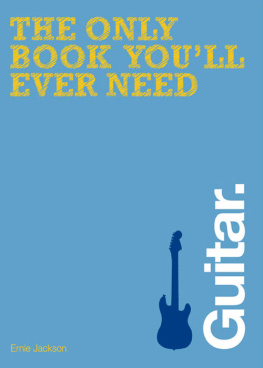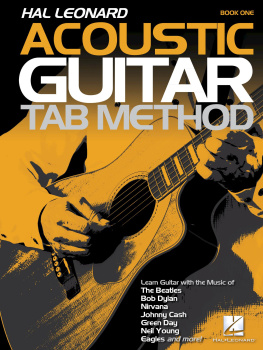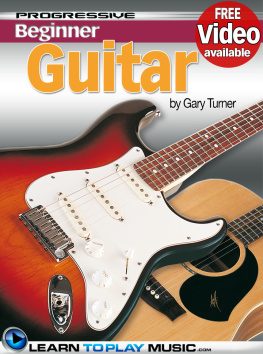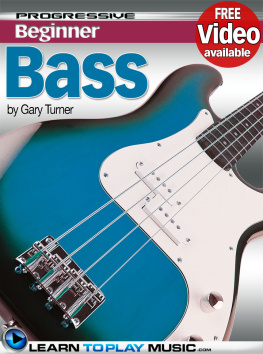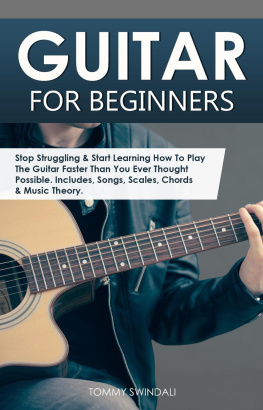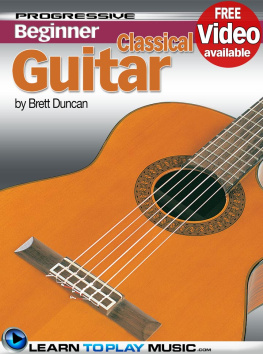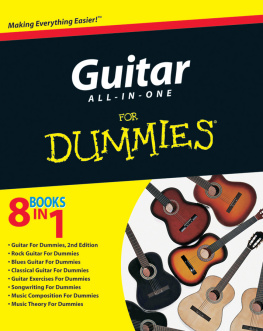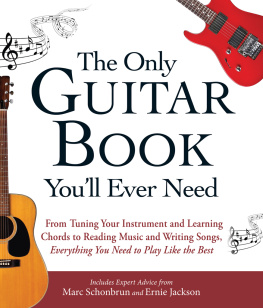THE ONLY BOOK
YOULL EVER NEED
Guitar

Preface
Dear Reader,
The guitar is a fantastic instrument. It has a cultured history that includes many different shapes and forms. It also has many beautiful sounds. The guitar can give you all that you could ever want in a musical instrument. This book tells you wonderful things about the guitar both old and new. It gives you a sampling of the different styles of music that are played on the instrument, shares some of the instruments history, and tells the stories of some of its most well-known and accomplished players.
I have been a guitarist for more than 25 years. In that time, I have seen many great instruments and players alike. This new age of guitar is exciting, and it continues to grow.
With the advent of new technologies in both manufacturing and production, higher-quality guitars have become easier to build and are now more affordable. This important combination allows all players, from the beginner to the old pro, to have great instruments on which to learn, practise and play while becoming more proficient. With this book, I hope to inspire you (and hopefully your friends) to find the fun in guitar playing and to make it more enjoyable.
Like every new endeavour, it will take time to grasp, but after that, its a fun ride. Enjoy,
Ernie Jackson
Top Ten Reasons for Playing the Guitar
Its really fun.
Its really easy.
Playing with others gives you more chance for social interaction.
Going to the music shop never gets boring.
Buying a new guitar every once in a while is far less expensive than buying a car.
It always feels great to learn and master a new song.
Playing the guitar gives you another reason to stand in front of the mirror for extended periods of time.
You can carry the guitar anywhere and break out in song.
Going to concerts and recital performances makes you a better player.
The more you play, the better youll get.
Introduction
Though the guitar has been around for a long time in forms dating back to the Persian ud, its early cousin, most players today think of it as an instrument that saw its greatest evolution in the 20th century. The turn of that century was marked by the concert-hall performances of Maestro Andrs Segovia. Blues mythology tells the story of Robert Johnson (who played so movingly it was said he had sold his soul to the devil for the gift). Charlie Christian brought fluid horn-line-inspired electric jazz guitar to the masses. Riding a wave through the 1960s, a decade that changed more than the weather, the brilliant rock guitarist Jimi Hendrix defined the modern conception of what this instrument can do.
The guitar itself is a remarkable instrument. Its six strings give it a musical range of more than half what the much larger and more complex piano can achieve, and the strings can be sounded together, giving the guitar the sense of being a small orchestra. It is more intimate and in some ways more responsive to a players mood than almost any other instrument. It has both a pure singing soprano as well as a resonant bass not bad for a musical instrument only three feet long that can weigh less than a good haul after a day of shopping.
More than players of almost any other instrument, guitar players count more self-taught musicians among their ranks. Thats because while the guitar is very difficult to play well, it is easy to play simply. Guitarists suffer from the usual string of bad jokes and stereotypes. But when it comes down to playing a good song, its the guitar that brings people closer together.
Chapter 1

The Origin of the Guitar
There are many theories on the origin of the guitar. In fact, the ancient pictures, drawings and paintings of many cultures suggest a guitar, though these are actually stringed instruments of varying types. For example, Babylonian excavations in Central Asia unearthed cave carvings dating back to 1900 BC that show musicians playing together. The carvings feature stringed instruments resembling guitars as well as techniques like strumming and plucking of the strings. Similar stringed instruments like the okongo or cora, are still used in parts of Africa to this day.
Early Guitars
Early Egyptian drawings show stringed instruments that resemble very complex lyres and harps. Ancient Rome was heavily influenced by Egyptian culture, and as a result there were many versions of these two instruments in early Western cultures. Around 400 AD, for example, the Romans brought their tanbur, also known as the cithara, to Spain.
The Greeks had a stringed instrument call the kithera. Though the spelling is close to the word chitara, it is not a direct ancestor of the modern-day guitar. The kithera is closer to a lyre or harp.
Varying types of stringed instruments developed in the pre-Christian Babylonian, Egyptian and Hittite cultures of the Middle East as well as in the Roman cultures in Italy, Greece and Turkey. All these instruments had certain aspects in common. Each had some sort of sound box and a long neck. Cords or strings were stretched down the neck and over the sound box. Players used one hand to strum (perhaps with a plectrum, or pick, of some sort) and the other to stop the strings at various points along the neck; as a result, they could sound a wide variety of notes, both singly and together.
Medieval Europe
In the early Middle Ages, as the Moors passed through Egypt on their way to conquer North Africa and Spain, they brought the ud, a direct antecedent of the guitar, to Western Europe. The Moorish influence in Spain prepared the groundwork for the development of the guitar in Europe. By the 13th century, references to and pictures of guitar-like instruments begin to appear in historic documents from all over Europe.
The Four-Course Guitar
It is possible that makers of the Roman-style cithara and the Arabic ud influenced one another. By ad1200, the four-string guitar had evolved into two types: the guitarra morisca (Moorish guitar), which had a rounded pear-shaped back, a wide fingerboard and several sound holes somewhat like a lute; and the guitarra latina (Latin guitar), which resembled a small version of the modern guitar, with one sound hole and a narrower neck. On either of these instruments, each pair of strings was called a course.
The guitar has many forebears and cousins the lute, the Middle Eastern oud, the Indian sitar, the banjo, the koto of Japan, the bouzouki of Greece, the vihuela, the yue-chin, chirar, balalaika, rehab, kayakeum, santir, ombi, vambi, nanga, shamisen and so on.
In 1487, a musical theorist named Johannes Tinctoris described an instrument he called the guiterra or the ghiterna, whose sides were tortoise-shaped. Guitar historians today believe that what Tinctoris actually saw was a round-back lute. In Italy, these instruments were known as the viola da mano and chitarra.
The Six-Course Guitar
While the guiterra was small and had four courses, the Italian chitarra was larger, with six courses. Both had thongs or cords tied at various places along the neck to make frets or squared-off divisions of the neck. These two instruments became the favourites of wandering troubadours or minstrels.
These early one-man bands had to master a variety of instruments, including pipes, whistles and flutes, plus perform songs, tell stories and provide any other form of entertainment that would earn them money and keep them from facing the displeasure of aggravated patrons.

